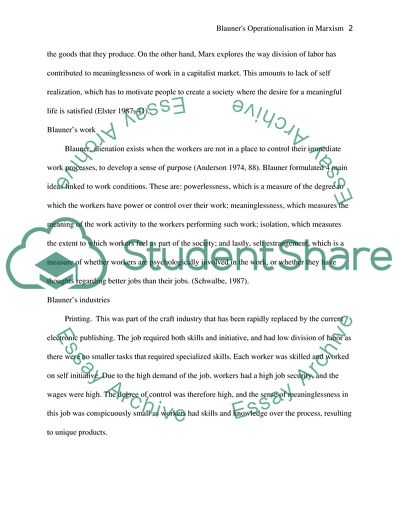Cite this document
(Blauner's Operationalisation in Marxism Essay Example | Topics and Well Written Essays - 1500 words - 4, n.d.)
Blauner's Operationalisation in Marxism Essay Example | Topics and Well Written Essays - 1500 words - 4. https://studentshare.org/sociology/1766568-to-what-extent-can-blauners-operationalisation-of-alienation-be-regarded-as-marxist
Blauner's Operationalisation in Marxism Essay Example | Topics and Well Written Essays - 1500 words - 4. https://studentshare.org/sociology/1766568-to-what-extent-can-blauners-operationalisation-of-alienation-be-regarded-as-marxist
(Blauner'S Operationalisation in Marxism Essay Example | Topics and Well Written Essays - 1500 Words - 4)
Blauner'S Operationalisation in Marxism Essay Example | Topics and Well Written Essays - 1500 Words - 4. https://studentshare.org/sociology/1766568-to-what-extent-can-blauners-operationalisation-of-alienation-be-regarded-as-marxist.
Blauner'S Operationalisation in Marxism Essay Example | Topics and Well Written Essays - 1500 Words - 4. https://studentshare.org/sociology/1766568-to-what-extent-can-blauners-operationalisation-of-alienation-be-regarded-as-marxist.
“Blauner'S Operationalisation in Marxism Essay Example | Topics and Well Written Essays - 1500 Words - 4”. https://studentshare.org/sociology/1766568-to-what-extent-can-blauners-operationalisation-of-alienation-be-regarded-as-marxist.


